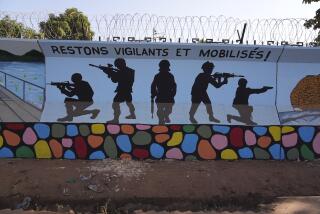Zaire Capital Ponders Fate as Rebels Approach
KINSHASA, Zaire — As rebels tarry to the east and the president languishes in his palace, the 5 million people of Kinshasa wait and wonder: How will their drama play out?
After six months of civil war in which the government’s forces mainly just melted away, rebel leader Laurent Kabila and his guerrilla fighters are headed for the capital of this vast central African country. They aim to claim their greatest prize and wrest power from President Mobutu Sese Seko--of this almost everyone feels certain.
Nobody really knows where Kabila’s troops are, though he has said he will be in Kinshasa within two weeks. Some radio broadcasts are saying he plans to launch his attack this weekend.
In the meantime, Zaire’s new prime minister, Likulia Bolongo, has been on state television urging calm and saying that the country’s defenders are ready to face the enemy.
Will Mobutu, Africa’s longest-ruling dictator after 32 years in power, decide to run or to stay? Will his army put up a real battle, desert en masse or turn its guns in vengeance on the people of Kinshasa in one final spasm of rape and pillage?
What will the United States and Europe do? With a rescue force in place across the river in Congo, will Western governments intervene to avoid a blood bath? Will diplomats arrange for Mobutu, now 66 and ill with prostate cancer, to get safely out of the country, or will they persuade the rebels to allow him to stay pending democratic elections?
The list of imponderables seems to grow with each day as rumors swirl through the markets and streets of this poverty-stricken city. One day there’s a report that Kabila’s men have come through Angola to seize the main Atlantic port, Matadi. Another day, newspapers quote security sources saying rebel infiltrators already have entered the capital.
In the past few days, Kabila’s forces have resumed their advance by capturing Ilebo, a port on the Kasai River, bringing them within 360 miles of Kinshasa, diplomatic sources and a rebel spokesman say. Meanwhile, a South African initiative to host Mobutu-Kabila peace talks apparently has stalled; Mobutu’s health does not permit the 2,000-mile journey to Cape Town, South Africa, his son told reporters Wednesday.
Kinshasa is a city ripe for change. Here, the best public transportation is broken-down Peugeot taxis, doors akimbo and crammed with 10 or more people as they bounce over the rutted pavement. Poverty is ubiquitous, from the clubfooted beggar boy pawing at the windows of cars stopped in traffic to the teenage girl in the market who says she prefers to stay in bed on alternate days because her family lacks money to feed her every day.
Nearly everyone has lost a relative to malaria or another death-dealing disease as hospitals crumble and doctors go unpaid.
A small elite has grown fat and sleek on Zaire’s legendary corruption. Its members emerge from walled and guarded compounds in late-model Mercedeses, wearing designer sunglasses and Swiss watches, to dine at swank restaurants where a dinner for two is never less than $100.
Most people say they cannot wait for Kabila and his forces to arrive. Yet there is widespread fear of what will happen when they do.
Many who could have fled to Brazzaville, the Congo capital across the Zaire River, their exodus filling the ferries with luxury cars. The very rich have fled farther--to Europe and South Africa.
Those who cannot run--the vast majority--are squirreling away what food they can, hiding small treasures such as radios and sewing machines and trying to anticipate where they will be safest if fighting starts.
The chief fear is not a battle itself--the government’s soldiers usually flee just ahead of Kabila’s arrival in a town--but that the troops will run amok, taking what they can, just before doffing their uniforms when Kabila’s forces come.
“People are going to church and praying--even the pagans are in church,” said Richards Nzangwa, a 32-year-old English teacher, the day after being robbed of $20 at gunpoint by four soldiers, in what he thinks is a foretaste of what soon will happen citywide. He felt lucky to have escaped with his life.
“We are really afraid,” said Kabita Buriji, a young woman working as a money-changer in the city’s Motonge district. “Do you think the American army can come here and do its best to protect us?”
One 40-year-old builder, who is so thin that he loops his belt around his waist twice, said he sees maize, rice and cassava disappearing from the markets and that some of his neighbors are stockpiling wood. “Maybe there will be no power, and they’ll need to burn it,” he said.
The uncertainty has interrupted life in other ways. Schools are barely functioning, and some businesses have closed because their owners have left.
Secondary school teacher Michel Luka said most of his pupils did not want to pay fees this term and therefore are barred from classes. “They think that when Kabila comes, school will be free. Or else they say, ‘Why should I pay today, when tomorrow I might get killed?’ ” he explained.
While most people want Mobutu to go, many would prefer to retire him through elections.
Kabila’s reputation ranges from avuncular to avenging, and Kinshasans shudder at stories that zealous, greed-fighting rebels have lopped off the ears of vendors caught price-gouging, or amputated the hand of a corrupt university president. Although popular, Kabila remains something of a question mark even to many sympathizers, said pollster Francesca Bomboko. “He needs to work on his democratic image.”
More to Read
Sign up for Essential California
The most important California stories and recommendations in your inbox every morning.
You may occasionally receive promotional content from the Los Angeles Times.










